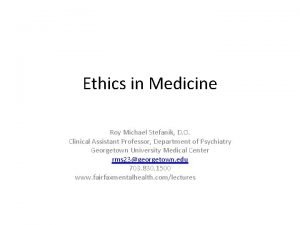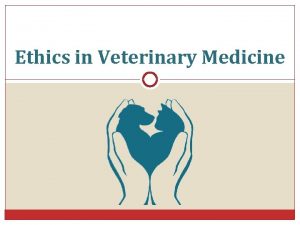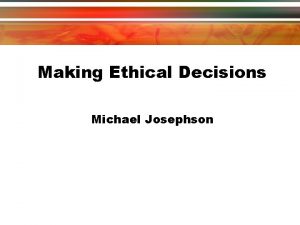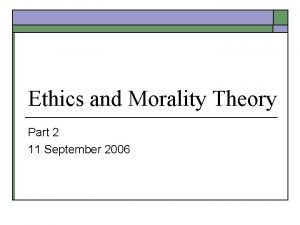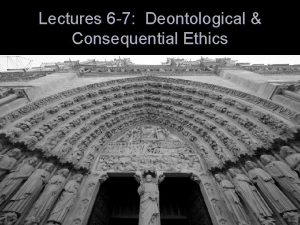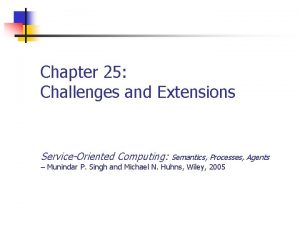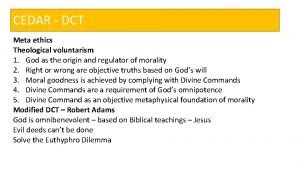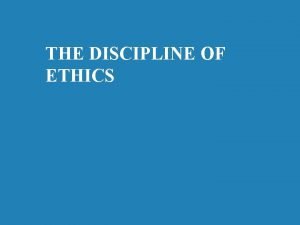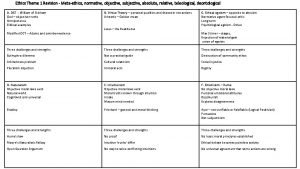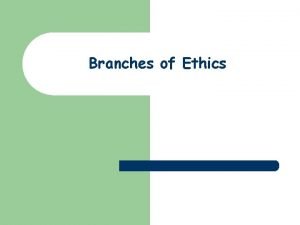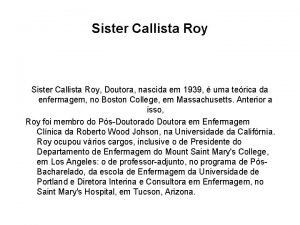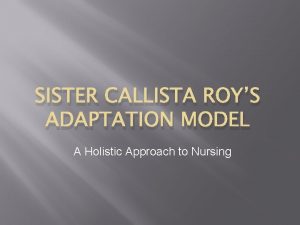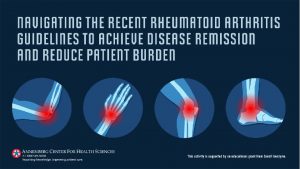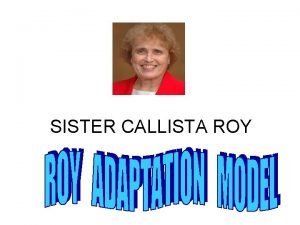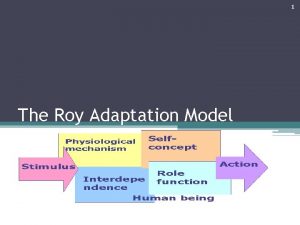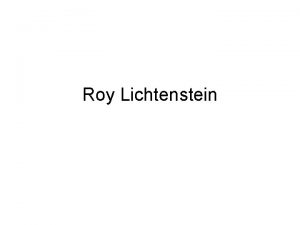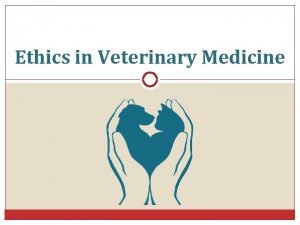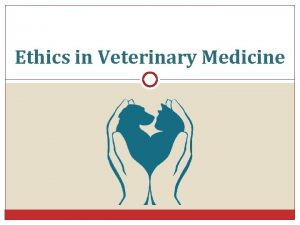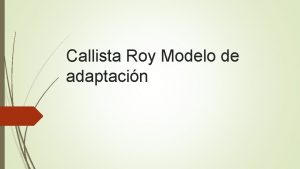Ethics in Medicine Roy Michael Stefanik D O

































































- Slides: 65

Ethics in Medicine Roy Michael Stefanik, D. O. Clinical Assistant Professor, Department of Psychiatry Georgetown University Medical Center rms 23@georgetown. edu 703. 830. 1500 www. fairfaxmentalhealth. com/lectures

Ethics in Medicine 1 • OPERATIONAL DEFINITIONS: • Ethics is a set of rules established by a group or organization that promotes acceptable behavior for members of that organization. • Applies to physicians, pharmacists, nurses, lawyers, accountants, plumbers, police officers, etc.

Ethics in Medicine 2 • How are morals different from ethics? • Morals are an individual’s deeply held personal values that help him or her determine right from wrong. These can be derived from parental and family values, cultural traditions, and religious beliefs.

Ethics in Medicine 3 • Medical ethics generally fall into several categories: • Clinical ethics - involve the patient-doctor relationship in the context of care for the patient. This involves the doctor’s relationship with the patient, the patient’s family, other health care workers, hospital administration, insurance companies, and pharmacy benefits managers.

Ethics in Medicine 4 • Medical ethics generally fall into several categories (cont. ): • Health Policy – Public policies that set the context in which physicians deliver care to patients. This can involve health insurance, access to care for the uninsured, allocation of scarce resources, public health polices (e. g. , reporting communicable diseases), and state laws regarding end-of-life care and confidentiality.

Ethics in Medicine 5 • Medical ethics generally fall into several categories (cont. ): • Bioethics – refers to broader philosophical questions raised by biomedical advances. • Involves issues relating to the beginning and end of human life, all the way from issues relating to in-vitro fertilization and abortion to euthanasia and palliative care.

Ethics in Medicine 6 • Medical ethics generally fall into several categories (cont. ): • Professional ethics – codes that dictate appropriate behavior on the part of the physician. Examples: • "First, do no harm. " • Hippocratic Oath - http: //guides. library. jhu. edu/c. php? g=202502 &p=1335759

Ethics in Medicine 7 • Problems with the Hippocratic Oath: • No input from patients or public (i. e. , highly paternalistic). • Grants patients little role in decision-making. • Does not require physicians to disclose information to patients, be truthful, not use placebos, or allow them to make informed choices.

Ethics in Medicine 8 • How does ethics differ from law? • Statutes, regulations, and court decisions can guide physicians as to what they may or may not do (e. g. , HIPAA). • Does not always provide definitive answers to ethical dilemmas. Example: • Criminal law identifies acts so wrong that physicians will be held legally liable. Ethics may focus on the right or best decision in a situation.

Ethics in Medicine 9 • How does ethics differ from law (cont. )? • The law explicitly grants physicians discretion in some situations (e. g. , when a patient lacks decision-making capacity, especially in an emergency situation). • The law may provide no clear guide to action on certain topics (e. g. , disclosing genetic information to relatives when the patient objects to disclosure).

Ethics in Medicine 10 Law and ethics may differ. Examples: • Abortion • Euthanasia • Medical marijuana • Healthcare workers refusing to provide treatment on religious grounds • Gender identity • CRISPR/gene editing • Human/animal hybridization • Artificial intelligence/algorithm creation?

Ethics in Medicine 11 • Six of the values that commonly apply to medical ethics discussions: • Autonomy- the patient has the right to refuse or choose their treatment. • Beneficence - a practitioner should act in the best interest of the patient. • Non-maleficence - “First, do no harm. "

Ethics in Medicine 12 • Justice- concerns the distribution of scarce health resources and the decision of who gets what treatment (fairness and equality). • Dignity- both the patient and the person treating the patient have the right to be valued and respected. • Truthfulness and honesty - the concept of informed consent. For instance, can the patient realistically make decisions regarding care? ***PATERNALISM VS. AUTONOMY – Utilitarianism vs. the rights of the individual***

Ethics in Medicine 13 Case 1 - An elderly woman with severe dementia develops pneumonia. Her daughter insists that hospitalization and administration of antibiotics would be pointless and that the patient would not want such “heroics. ” Her son, however, demands that her pneumonia be treated because he believes that life is sacred.

Ethics in Medicine 14 • Case 1 (cont. ): • Should the physician withhold or administer antibiotics? • Who should be patient’s surrogate when she cannot speak for herself? • Furthermore, what are the reasons that the physician can give to justify the decision to the patient’s children and to other health care workers caring for the patient?

Ethics in Medicine 15 • Case 1 (cont. ): • Most states allow physicians to determine when a patient lacks decision-making capacity and thus, when a surrogate should take over the role of making the decision with the physicians. • ***IF YOU DON’T KNOW WHAT TO DO, ASK FOR HELP. ***

Ethics in Medicine 16 • Case 2: A 32 year old man with a positive test for human immunodeficiency virus (HIV) antibodies refuses to notify his wife. “If she finds out, it will destroy our marriage. ” Although maintaining patient confidentiality is important, it seems cruel not to warn the wife that she is at risk for a fatal infection. What are the reasons that justify the physician’s decision?

Ethics in Medicine 17 • Case 2 (cont. ): • Some states give physicians discretion whether or not to override confidentiality to protect partners of HIV-infected persons. In these circumstances, physicians must turn to ethical and clinical considerations, not legal ones. In Virginia, you are required to disclose it to the state health department but are not required to disclose to anyone else. • http: //www. hivlawandpolicy. org/states/virginia

Ethics in Medicine 18 • Case 2 (cont. ) • Do health care workers have to disclose their HIV status? • In general, according to case law and professional practice guidelines (such as from the AMA), health care workers have a duty to inform patients or employers that they are HIV positive if they perform invasive or "exposure-prone" procedures on patients.

Ethics in Medicine 19 • Case 3: A 67 year old man with chronic obstructive lung disease (COPD) has dyspnea after walking one block. He is on an optimal medical regimen of inhaled bronchodilators and corticosteroids. His resting arterial O 2 level is 65 mm Hg and it does not decrease with exercise. This exceeds the level that qualifies for Medicare coverage of home oxygen. The patient pleads, “Can’t you just write that the oxygen level is 58? I need to do something about this breathing. ”

Ethics in Medicine 20 • Case 3 (cont. ) • The Medicare criteria for home oxygen is clear: an arterial oxygen level of under 60 mm Hg. Giving false information to obtain Medicare coverage is considered fraud. Physicians should follow the law. • Professional ethics, however, requires physicians to go beyond their legal duties, to act with compassion and respect, and to respond to the patient’s distress. • (E. g. , Emotional support animals? )

Ethics and Medicine 21 Case 4: A physician goes to a pharmacy one evening to pick up a prescription for her teenage son’s antibiotic. When she finds out there are no refills and it is not an emergency, she informs the pharmacist she will authorize the refill. The pharmacist refuses. The physician becomes angry and threatens to report the pharmacist to the Virginia Board of Medical Professions.

Ethics in Medicine 22 Case 4 (cont. ): A physician can prescribe to him or herself or a family member if he or she maintains a patient record indicating a practitioner-patient relationship. A physician cannot prescribe controlled drugs to his or herself. S/he cannot to family members except in emergency situations. https: //www. dhp. virginia. gov/medicine_f aq. htm

Ethics in Medicine 23 Case 5: At the end of a visit, a patient hands to the doctor a small gift-wrapped box in deep gratitude for the care the patient and family has received over the years. When the doctor opens it, it is a $3, 000 Rolex watch.

Ethics in Medicine 24 Case 5 (cont. ): The role of accepting gifts is an extremely complex one in the medical profession. To turn away a small gift could be perceived as a rejection of the patient’s well-meaning act and could be hurtful to the patient-doctor relationship.

Ethics in Medicine 25 Case 5 (cont. ): On the other hand, physicians should not accept expensive gifts that potentially exploit vulnerable patients. In addition, it may put the physician at the risk of feeling a need to reciprocate in turn with granting favors, inappropriate prescribing, boundary-crossing, or other behaviors that are potentially harmful to the doctor-patient relationship.

Ethics in Medicine Part 1 26 Case 6: A 29 year old man with a history of multiple bowel surgeries is been seen for severe depression and chronic pain. He has recently begun smoking medical-grade marijuana he received from a physician in another state. It becomes apparent that his pain management is being provided by multiple doctors with little or no collaboration of care.

Ethics in Medicine Part 1 27 Legalization (and in particular, the medicalization) of marijuana has become a very contentious issue. Medical use of marijuana, under certain circumstances, has the potential to provide pain relief and physical symptoms such as muscle spasticity in multiple sclerosis or nausea from cancer chemotherapy. It is currently a Schedule I drug due to its abuse potential.

Ethics in Medicine Part 1 28 Drawbacks: 1. Don’t know dosage, frequency, duration of treatment. 2. No standardization of treatment or even dosage form. 3. Abuse potential and withdrawal symptoms from discontinuation well documented. 4. Diversion risk.

Ethics in Medicine 29 Should medical and/or recreational marijuana be legalized? The California medical marijuana law, passed through voter referendum (Proposition 215) in 1996, permits the use of marijuana for “cancer, anorexia, AIDS, chronic pain, spasticity, glaucoma, arthritis, migraine, or any other illness for which marijuana provides relief.

Ethics in Medicine 30 • FDA News Release, November 1, 2017: “The FDA has grown increasingly concerned at the proliferation of products claiming to treat or cure serious diseases like cancer. In this case, the illegally sold products allegedly contain cannabidiol (CBD), a component of the marijuana plant that is not FDA approved in any drug product for any indication. CBD is marketed in a variety of product types, such as oil drops, capsules, syrups, teas, and topical lotions and creams. The companies receiving warning letters distributed the products with unsubstantiated claims regarding preventing, reversing or curing cancer; killing/inhibiting cancer cells or tumors; or other similar anti-cancer claims. Some of the products were also marketed as an alternative or additional treatment for Alzheimer’s and other serious diseases. ”

Ethics in Medicine 31 • Washington Post, January 24, 2018 - Vermont has become the first state in the nation to legalize marijuana legislatively. • Gov. Phil Scott (R) signed a bill Monday legalizing marijuana for adults age 21 and older. It allows for the possession of up to an ounce of marijuana, as well as two mature and four immature plants. Vermont becomes the ninth state to legalize recreational marijuana for adults, but the other states did so through ballot initiatives. • Vermont’s law also is notable for what it does not do: create a state marketplace for sales of the drug.

Ethics in Medicine 32 • News Leader, February 5, 2018 - RICHMOND — The Virginia Senate voted unanimously Monday to pass the Joint Commission on Health Care bill SB 726, which will let Virginia doctors recommend the use of cannabidiol oil or THC-A oil for the treatment of any diagnosed condition or disease. • This comes on the heels of Friday’s unanimous passing of the companion bill, HB 1251, in the Virginia House of Delegates. • Regular Virginians suffering from a variety of conditions — including cancer, Crohn's disease and PTSD — have lobbied passionately for this reform.

Ethics in Medicine 33 • What factors may influence the physician’s decision making or recommendations? 1. Prior experiences 2. Physician’s and patient’s tolerance of risk (e. g. , Lamictal, choice of medical specialties) 3. Personality style of the physician (e. g. , ER vs. pathology) 4. Potential legal ramifications

Ethics in Medicine 34 • Legal concept of informed consent: Mr. T was an 88 year old man with severe chronic obstructive pulmonary disease (COPD), coronary artery disease, and peptic ulcer disease. He developed an adenocarcinoma of the lung which could be treated with surgery or radiation therapy.

Ethics in Medicine 35 His physician was reluctant to recommend surgery because of the patient’s increased operative risk. In addition, his COPD was so severe that he might be dyspneic after a pneumonectomy. When his doctor discussed alternatives for treatment, Mr. T said, “Do what you think is best. You’re the doctor. ”

Ethics in Medicine 36 • What is informed consent? It is the process by which the treating health care provider discloses appropriate information to a competent patient so that the patient may make a voluntary choice to accept or refuse treatment.

Ethics in Medicine 37 • It is generally accepted that informed consent includes a discussion of the following elements: – The nature of the decision/procedure – Reasonable alternatives to the proposed intervention – The relevant risks, benefits, and uncertainties related to each alternative – Assessment of patient understanding – The acceptance of the intervention by the patient

Ethics in Medicine 38 Informed Consent: Options for the patient - 1. Agreement with the physician’s recommendations 2. Right to refuse interventions 3. Choice among alternatives 4. Shared decision making

Ethics in Medicine 39 Informed consent : Reasons - 1. Respect patient’s self determination 2. Enhance patient’s wellbeing 3. Fulfill legal requirements

Ethics in Medicine 40 Problems with informed consent: 1. Some patients do not understand medical information 2. Some patients do not want to make decisions (see prior case) 3. Patients might not want to make decisions individually 4. Patients often decide without deliberating about risks and benefits 5. Patients cannot anticipate how they will react to future conditions 6. Patients make decisions that contradict their best interests

Ethics in Medicine 41 Is health care a right or a privilege?

Ethics in Medicine 42

Ethics in Medicine 43 • A 56 year old man has been disabled with chronic back pain for 10 years. Extensive evaluations including an MRI have been negative. Exercise and physical therapy have provided only minor improvement. After changing health insurance plans, the patient visits a new physician and requests a refill for eight 160 mg. tablets of oxycodone (Oxycontin) daily.

Ethics in Medicine 44 • He says that he has not changed the dosage in several years. His new physician does not prescribe opioids at this strength and dosage for chronic pain. She wants to wean the patient off opioids and to help him live an active life despite the pain. The patient refuses a referral to a pain clinic. “I know that Oxycontin works. Nothing else helps me, ” he states.

Ethics in Medicine 45 • Risks of treatment are significant. These include abuse, diversion, addiction, and lack of objective data to assess pain. Benefits to the patient are also significant. These include reduction of severe pain and enhancing function. • February 24, 2017 - The number of deadly heroin overdoses in the United States more than quadrupled from 2010 to 2015, as the price of the drug dropped and its potency increased. There were 12, 989 overdose deaths involving heroin in 2015, according to the National Center for Health Statistics, compared with 3, 036 such fatalities five years earlier.

Ethics in Medicine 46 Confidentiality: A 32 year old woman is admitted to the hospital after a serious MVA. She is disoriented and confused. The patient’s sister requests that the patient’s husband not be given any information. The patient has previously told the physician about her hostile divorce proceedings. The husband, however, learns that she is hospitalized and inquires about her condition.

Ethics in Medicine 47 Confidentiality (Cont. ): HIPAA privacy regulations as well as state privacy laws indicate a need to notify patients that relatives will be informed in an emergency unless the patient requests that they not be. In ethical terms, the physician can presume that patients would want their relatives notified. In this case, the presumption no longer holds. The physician should refer the husband to the patient’s sister or other relatives for details.

Ethics in Medicine 48 Confidentiality (Cont. ) – when to disclose? 1. Disclosure to relatives and friends? 2. Information about public figures? 3. Omitting sensitive information from medical records? 4. Overriding confidentiality to protect third parties?

Ethics in Medicine 49 Avoiding deception and nondisclosure: Mr. Z, a 70 year old Cantonese-speaking man, with a change in bowel habits and weight loss is found to have a carcinoma of the colon. The daughter and son ask the physician not to tell their father that he has cancer. They say that people in his generation are not told they have cancer and that if Mr. Z is told he will lose hope.

Ethics in Medicine 50 Reasons for deception or non-disclosure: 1. 2. May prevent serious harm to patient (e. g. , lose hope, refuse treatment, or become depressed) Deception is culturally appropriate: Percentage of patients who want to be told if they have cancer: 87% of European Americans 89% of African Americans 65% of Mexican Americans 47% of Korean Americans 3. Deception may enhance patient autonomy

Ethics in Medicine 51 Reasons against deception and non-disclosure: 1. Most patients want to know their diagnosis and options for care (94% of US patients) 2. Patients need information for decisions 3. Disclosure is more beneficial than harmful consequences 4. Deception and non-disclosure require more deception 5. Deception and non-disclosure might be impossible, especially in a hospital setting

Ethics in Medicine 52 Deceiving a patient to administer needed information: Mr E. , a 32 year old man with bipolar disorder, discontinued his medications and developed mania. He formed a specific plan to murder his father and kill himself. Mr. E’s sister persuaded him to come to the emergency department (ED) but he would not anyone touch him or examine him and refused medications or admission.

Ethics in Medicine 53 Deceiving a patient to administer needed information (continued) She said that previous violent confrontations with ED staff during periods of mania had caused physical and psychological injury. Mr. E’s sister agreed to injecting haloperidol and lorazepam into a sealed juice container and gave him the juice. These events were documented in the medical record. Mr. E accepted the drink, and 45 minutes later was calm, cooperative, and agreeable to psychiatric hospitalization.

Ethics in Medicine 54 Reasons in favor of deception: 1. There are no less problematic alternatives (last resort) 2. Medication would restore patient’s ability to make an informed decision 3. The patient’ surrogate authorizes deception

Ethics in Medicine 55 Reasons against deception: 1. Slippery slopes 2. Long-term and indirect consequences/potential for abuse 3. Legal/moral objections

Ethics in Medicine 56 Disagreements in care: Mr. H was a 29 year old man with end-stage cystic fibrosis who was admitted to the hospital for antibiotics and respiratory therapy He was emaciated, required home oxygen, and was dyspneic walking around his home. During conversations he often paused to catch his breath or to cough up thick secretions. Lung transplantation was not an option for him because of recurrent aspiration pneumonia.

Ethics in Medicine 57 Ethical considerations: 1. Requests that “everything be done” – define 2. Religious based insistence on interventions 3. Request for interventions that cause the patient’s suffering

Ethics in Medicine 58 Recommendations: 1. Understand the patient’s or surrogate’s perspective 2. Respond to the patient’s or surrogate’s needs or emotions 3. Be sensitive to cultural and religious issues 4. Use time constructively 5. Find common ground for ongoing care

Ethics in Medicine 59 Florida ‘gun gag’ law provisions struck down by appeals court February 23, 2017 - The 11 th U. S. Circuit Court of Appeals has struck down key portions of a Florida law that restricted the ability of physicians to communicate freely with their patients about firearms safety. In an en banc decision (i. e. , all the judges in the court) overturning an earlier three-judge panel ruling, the court ruled that Florida’s Firearms Owners’ Privacy Act infringes on the free speech rights of physicians.

Ethics in Medicine 60 • “Florida may generally believe that doctors and medical professionals should not ask about, nor express views hostile to, firearms ownership, but it ‘may not burden the speech of others in order to tilt public debate in a preferred direction, ’” Judge Adalberto Jordan wrote for the majority, quoting the words of a Supreme Court opinion in another case of speech rights in a medical context. Physicians, Judge Jordan added, must have the ability to communicate in a frank and open manner with patients. • Florida officials may appeal the decision to the U. S. Supreme Court.

Ethics in Medicine 61 • January 28, 2019 - Chinese investigators have determined that the doctor behind the reported birth of two babies whose genes had been edited in hopes of making them resistant to the AIDS virus acted on his own and will be punished for any violations of the law, a state media report said Monday. • Emails obtained by The Associated Press show Chinese scientist He Jiankui told Nobel Prize-winning scientist Craig Mello about the gene-edited babies in April 2018, months before the claim became public. Mello objected to the experiment and remained an adviser to He’s biotech company for eight more months before resigning.

Ethics in Medicine 62 • • • January 22, 2019 - The New York State Senate passed the Reproductive Health Act (RHA) this evening by a vote of 38 -24, on the 46 th anniversary of the Supreme Court decision in Roe v. Wade, which found that a woman has a constitutional right to abortion. The bill already passed the state assembly by a 92 -47 vote. Once signed by Democratic governor Andrew Cuomo, who has long pushed for expansive abortion-rights legislation, the bill will expand the state’s already liberal abortion regime to allow late-term abortions when “the patient is within twentyfour weeks from the commencement of pregnancy, or there is an absence of fetal viability, or the abortion is necessary to protect the patient’s life or health. ” The legislation provides a further exception to permit abortion at any point during pregnancy if a health-care practitioner deems it necessary for the mother’s life or health — the exception that was defined in Roe companion case Doe v. Bolton as “all factors — physical, emotional, psychological, familial, and the woman’s age — relevant to the wellbeing of the patient. ” In other words, abortion will be available to women essentially on demand up to the point of birth. The RHA will also decriminalize abortion, moving it from the state’s criminal code to the publichealth code.

Ethics in Medicine 63 • Recommended Texts: • Resolving Ethical Dilemmas – A Guide For Clinicians – Bernard Lo, MD • Case Studies in Biomedical Ethics – Decision. Making, Principles, and Cases – Robert M. Veach and Amy M. Haddad (Commonly used textbook in Bioethics classes)

Ethics in Medicine 64
 Roy stefanik
Roy stefanik Martin košovan
Martin košovan Ethical issues in veterinary medicine
Ethical issues in veterinary medicine Michael josephson ethics
Michael josephson ethics Descriptive ethics vs normative ethics
Descriptive ethics vs normative ethics Example of deontology
Example of deontology Difference between micro ethics and macro ethics
Difference between micro ethics and macro ethics Beneficence
Beneficence Teleological ethics vs deontological ethics
Teleological ethics vs deontological ethics Descriptive ethics vs normative ethics
Descriptive ethics vs normative ethics Is/ought distinction
Is/ought distinction Descriptive ethics vs normative ethics
Descriptive ethics vs normative ethics Methaethics
Methaethics Metaethics vs normative ethics
Metaethics vs normative ethics Realism vs anti realism
Realism vs anti realism Roy sturgill
Roy sturgill Zulu girl poem
Zulu girl poem Roy d. shapiro
Roy d. shapiro Camp roy c manchester
Camp roy c manchester Indrakshi roy
Indrakshi roy Roy mariuzza
Roy mariuzza Fr roy bourgeois
Fr roy bourgeois Roy lichtenstein
Roy lichtenstein Thomas roy markusen
Thomas roy markusen Prof roy sembel
Prof roy sembel Kees dullemond
Kees dullemond Modèle de roy et square apraxie
Modèle de roy et square apraxie Modelo de callista roy
Modelo de callista roy America the beautiful poem
America the beautiful poem Roy kerner
Roy kerner Sister callista roy nursing theory
Sister callista roy nursing theory Roy fleischmann
Roy fleischmann Laurie pennings
Laurie pennings Roy planted a vegetable garden in his backyard
Roy planted a vegetable garden in his backyard Jasper johns
Jasper johns Roy adaptacijski model
Roy adaptacijski model Roy pinnock dentons
Roy pinnock dentons Roy gane
Roy gane Claude henri de rouvroy
Claude henri de rouvroy Telestesia significado
Telestesia significado 50 shades of gray wikipedia
50 shades of gray wikipedia Roy g bv
Roy g bv אסף פלר
אסף פלר Roy campbell uiuc
Roy campbell uiuc Hubbart formula
Hubbart formula Contextual stimuli examples
Contextual stimuli examples Callista roy biographie
Callista roy biographie Ceci roy
Ceci roy Jeff roy holland
Jeff roy holland Roy schulte
Roy schulte Roy lichtenstein
Roy lichtenstein Pop art self portrait
Pop art self portrait Gareth roy
Gareth roy Flocaublary
Flocaublary Didi roy
Didi roy Rbar
Rbar Bittaker and norris polaroids
Bittaker and norris polaroids This is your life roy rogers
This is your life roy rogers Romit roy choudhury
Romit roy choudhury Rrrlf in modernisation of libraries
Rrrlf in modernisation of libraries Roy afl ruckman immortalised in song
Roy afl ruckman immortalised in song Roy fieldings
Roy fieldings Romit roy choudhury
Romit roy choudhury Aqeedah roy
Aqeedah roy Roy cabonegro
Roy cabonegro Roy matthews bainbridge high school
Roy matthews bainbridge high school
